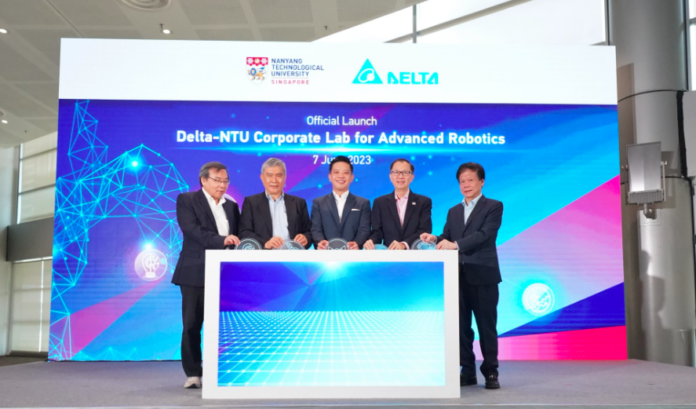Nanyang Technological University (NTU Singapore) and Delta Electronics, global provider of IoT-based Smart Green Solutions, have established the S$24 million Delta-NTU Corporate Lab for Advanced Robotics.
The lab, supported under Singapore’s National Research Foundation’s Research Innovation and Enterprise (RIE) 2025 plan, will develop over three years next- generation technologies aimed at overcoming labour shortage challenges for the manufacturing and intralogistics – the logistical flows of goods and materials that take place on a company’s site – industries.
Collaborative robotic systems are set to become a staple as businesses transit into Industry 5.0, and as the world grapple with a manpower crunch arising from an ageing workforce and declining birth-rates.
Such systems include human-touch inspired robots that can adjust their grip to pick up a range of materials, from fragile glassware to volatile chemicals, and smart sensing, radar and 3D sensors systems, which allow autonomous mobile robots (AMRs) to operate in a dynamic environment with human traffic like hospitals and warehouses.
“The lab creates opportunities for us to translate our research into impactful, real-world innovations,” said NTU president Ho Teck Hua.
“This is in line with the NTU 2025 strategic vision, to harness the power of digital and advanced technologies to support the discovery of new knowledge and promote better learning and living experiences,” said Ho.
Yancey Hai, chairman of Delta Electronics, said they intend to leverage Delta’s smart manufacturing prowess and autonomous mobile robot know- how, as well as our Delta-NTU R&D talent to develop essential technologies for the next-generation of autonomous mobile robots.
“The innovation milestones of this lab will help multiple industries solve key challenges, enhance Singapore’s long-term resilience, and improve the quality of life of its citizens,” said Hai.
The establishment of the joint lab marks a new phase of the partnership between NTU and Delta Electronics.
In 2016, the Delta-NTU Corporate Laboratory for Cyber-Physical Systems was launched with a focus on using cyber-physical systems to build technological capabilities for use in Smart Manufacturing and Smart Learning. In 2018, the lab was expanded to accommodate more research activities.
Over the five years, the team filed 17 patents, of which eight have been issued, and submitted over 200 papers to journals and conferences. It also supported more than 140 NTU research staff and graduate students, as well as scientists and engineers from the Delta Research Centre in Singapore.
Notable projects include a universal smart navigation system where logistics robots autonomously move goods around factory floors, and a learning analytics technology to improve learning effectiveness in the education industry. These innovations, which were test bedded on NTU’s Smart Campus, are now being scaled up for wider adoption in the industry.
















